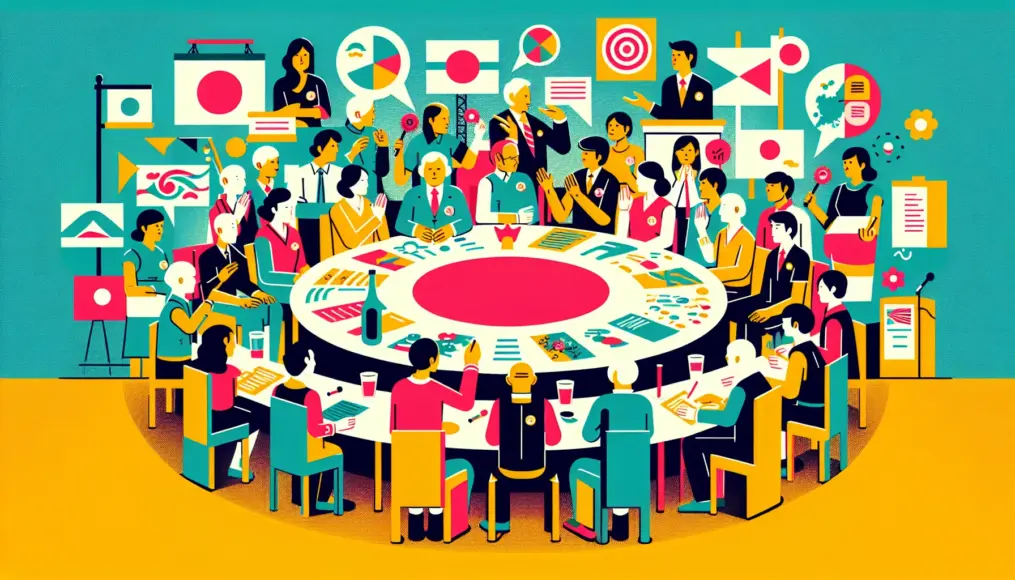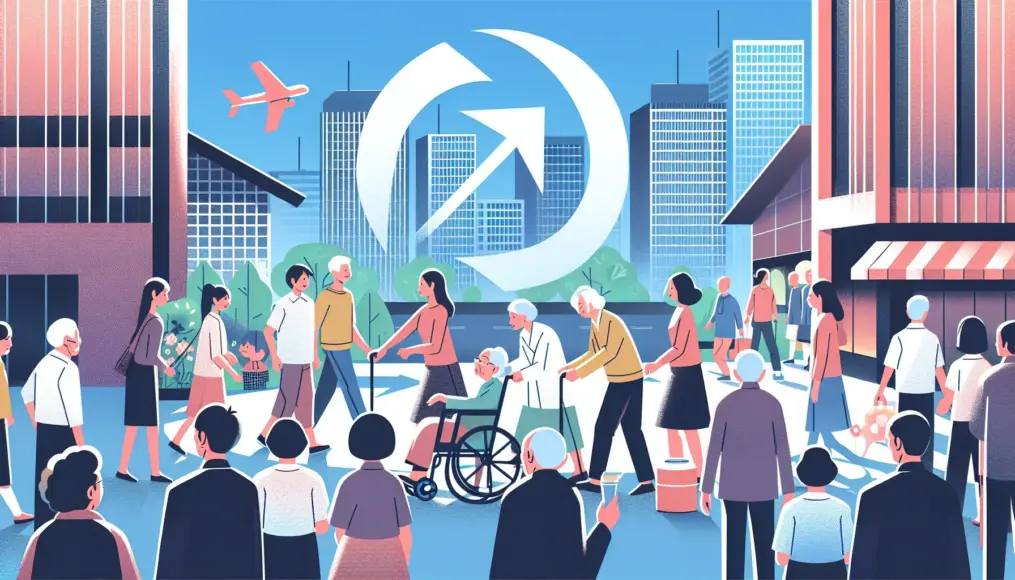Civil society is a crucial concept deeply embedded in our lives and society. Throughout history, it has undergone various transformations, significantly influencing modern politics and social activities. In this article, we will explore how civil society has been shaped and evolved over time, as well as its roles and prospects for the future.
It’s important to recognize that the civil society activities we encounter in our daily lives are not mere events; they are rooted in a rich historical context. The development of civic participation and democracy are foundational elements of our society, and understanding them is key to building a better future.
- We will explore the definition and historical background of civil society.
- We will examine the changes in civil society and their impact on the modern world.
- We will look ahead to the roles and future of civil society in contemporary society.
What is Civil Society?
Civil society plays a crucial role in our lives. Generally, it refers to the structures of non-governmental society formed by individuals and organizations, but its definition can vary. In this section, we will delve into how civil society is defined and the historical context that has shaped it. Understanding civil society significantly influences how we perceive and engage with our current society.
Civil society serves as a platform for individuals to express their opinions and interests, and it can be seen as the foundation of democracy. The development of this concept has been influenced by various factors throughout history. By examining the different forms of civil society across different times and places, we gain a deeper understanding of the roles and responsibilities of citizens within our society.
Defining Civil Society
Civil society typically refers to the collection of organizations, groups, and communities that operate independently of the government. This includes non-profit organizations, volunteer groups, and local community activities. Civil society is also a vital space for protecting individual freedoms and rights and raising voices on social issues.
While the definition of civil society may differ by country and culture, it is commonly understood as “a space where people gather and act with shared goals and interests.” Such activities are essential for the health of society and the development of democracy.
- Civil society is a collective of organizations and groups that operate independently from the government.
- It includes non-profit organizations and community initiatives, safeguarding individual freedoms.
- Civil society is an important platform for voicing social issues.
Historical Background
The origins of civil society can be traced back to ancient Greece and Rome. During that time, holding citizenship and participating in public discussions and decisions was highly valued. This laid the groundwork for later democratic ideals and continues to influence modern civil society.
From the Middle Ages to the modern era, the growth of commerce and the rise of the bourgeoisie spurred the development of civil society. Notably, with the spread of Enlightenment thought, the emphasis on individual rights and freedoms led to the formation of various civic organizations. This created a trend where citizens became actively involved in addressing social issues.
For those seeking a deeper understanding of civil society, I highly recommend checking out this article: “What is the Essence of Citizen Activism? Exploring the Power to Change Society.” This piece elaborates on the importance of civic engagement, its historical context, and the role of citizens in contemporary society, offering valuable insights to further broaden your understanding of civil society.
- The roots of civil society lie in ancient Greece and Rome.
- The development of commerce from the Middle Ages to modern times contributed to the growth of civil society.
- Enlightenment thought fostered a focus on citizens’ rights and freedoms.
The Historical Evolution of Civil Society
Civil society is a dynamic concept that continues to evolve over time. In this chapter, we will begin by exploring the origins of civil society and investigate its transformations throughout various historical periods. By understanding the historical shifts in civil society, we can uncover how modern civil society has been shaped and the underlying factors that have influenced its development.
Civil society has not only evolved through a chronological lens but also as a result of people’s responses and activities in the face of societal changes. This insight allows us to delve deeper into the roles and impacts of civil society in our world today.
The Origins of Civil Society
The roots of civil society can be traced back to ancient societies. In ancient Greece and Rome, the importance of citizens engaging in public discourse and participating in politics was paramount. This emphasis fostered individual rights and freedoms, laying the groundwork for what would later become civil society.
Additionally, during the medieval period in Europe, institutions such as churches and guilds played a vital role within civil society. These organizations helped individuals protect their interests while strengthening social connections. Thus, early civil society emphasized both personal freedom and community solidarity.
- The origins of civil society lie in ancient Greece and Rome.
- Public discourse served as the foundation of civil society.
- Medieval churches and guilds were crucial elements of civil society.
Changes Across Eras
As time progressed, civil society underwent various transformations. With the advent of modernity, the rise of commerce and the emergence of a middle class led to a strengthening of individual rights, invigorating civic groups and social movements. The Enlightenment of the 18th century had a particularly profound influence, spreading ideas of freedom and equality.
By the 20th century, there was an increasing recognition of the importance of civil society from an international perspective, which called for the participation of individuals with diverse values. This period witnessed a surge in various social and human rights movements, leading to greater involvement of people in civil society.
- The modern era saw a strengthening of individual rights.
- Enlightenment thought greatly influenced the development of civil society.
- The 20th century called for the participation of citizens with diverse values.
The Role of Civil Society in Modern Society
In today’s world, civil society has evolved beyond being just a platform for activities; it plays a crucial role as a powerful force influencing politics and society. Civil society encompasses individuals and organizations coming together to work towards common goals, supporting democracy and contributing to social development. In this section, we will explore the role of civil society from two perspectives: political influence and social contribution.
Active participation in civil society has become an essential element in policy-making and addressing social issues. When individuals raise their voices and share diverse viewpoints, it sparks movements aimed at creating a better society. Let’s take a closer look at how our lives have been transformed through these efforts.
Political Influence
Civil society has strengthened its influence over politics significantly. Through the efforts of civic organizations and NGOs, they can engage in the creation of policies and laws while shining a spotlight on specific social issues. For example, initiatives focused on environmental and human rights issues play a critical role in exerting pressure on governments and corporations.
Moreover, civil society is essential in electoral activities and political movements. When citizens express their opinions and participate in elections, they help lay the foundation for a thriving democracy. In this way, civil society becomes a driving force for making politics more transparent and fair.
- Civic organizations are involved in policy and lawmaking
- Activities addressing environmental and human rights issues are crucial
- Citizens’ expression of opinions supports democracy
Social Contribution
Civil society also makes significant contributions to society as a whole. An increasing number of citizens are engaging in volunteer activities, local events, and the work of support organizations, tackling social issues in diverse ways. This involvement revitalizes communities and fosters a culture of mutual support.
Furthermore, the contributions of civil society in areas such as education, welfare, and health promotion are invaluable. Through various programs and services, they support individuals facing challenges, striving for a more inclusive society. Such activities deepen social bonds and lay the groundwork for building a better future.
- Volunteer activities are revitalizing local communities
- Civil society’s contributions in education and welfare are vital
- Activities that strengthen social bonds form the foundation for a brighter future
Challenges and Future of Civil Society
Civil society plays a significant role in our lives and communities, but it also faces a myriad of challenges. In this chapter, we aim to shed light on the issues and hurdles confronting modern civil society, while exploring potential solutions. Additionally, we will consider how civil society might evolve in the future.
By understanding the challenges that civil society faces, we can identify concrete actions to build a better society. This understanding allows us to look ahead with hope about how civil society can develop in the years to come.
Current Challenges
The challenges faced by contemporary civil society are diverse. One major issue is the confusion stemming from information overload. With the rise of social media and the internet, anyone can easily share information. However, this has also led to the rapid spread of misinformation and biased content, which can negatively impact public judgment.
Economic inequality and social injustice are also pressing problems. While certain groups find it easier to engage with civil society, others are often left out of the conversation. This disparity calls for the establishment of a system where all citizens can participate equally.
- Information overload affects public judgment
- Economic inequality limits participation in civil society
- Social injustice needs to be addressed
Future Prospects
The future of civil society holds many possibilities. One of the most promising developments is the advancement of technology, which is expected to enhance civic engagement. Online platforms and apps are making it easier for more people to express their opinions and get involved in various activities.
Moreover, it’s essential to improve civic awareness through education and outreach initiatives. When citizens understand their rights and responsibilities and actively engage in societal matters, a healthier civil society can emerge.
As we reflect on the challenges and future of civil society, the importance of citizen participation stands out. If you’re interested in the realities of civic engagement and how it’s changing, check out this article: “Exploring the Behind-the-Scenes of Election Campaigns! Customs and Changes in Japanese Politics.” It will provide valuable insights into how our political participation is evolving through election campaigns.
- Technological advancements promote civic participation
- Education and outreach enhance civic awareness
- A healthier civil society is on the horizon
Conclusion
Civil society is an essential component of our lives and plays a pivotal role in supporting democracy. Through this article, we’ve gained a deeper understanding of the definition, historical evolution, modern significance, and future prospects of civil society. By being aware of the challenges faced by civil society and seeking solutions, we can contribute to building a better society.
Moreover, the evolution of technology and the importance of education have been highlighted as key factors driving the development of civil society. To create a more robust and inclusive civil society moving forward, it is crucial for each of us to take an active part in the process.
- Civil society supports the foundation of democracy.
- Modern civil society faces numerous challenges.
- Technology and education are key drivers of civic engagement.
By engaging with civil society, we can take a meaningful step toward building a brighter future. We welcome any thoughts or opinions you may have about this article, so please feel free to share your comments!



Comment